20 Huge Retailers That Are No Longer With Us
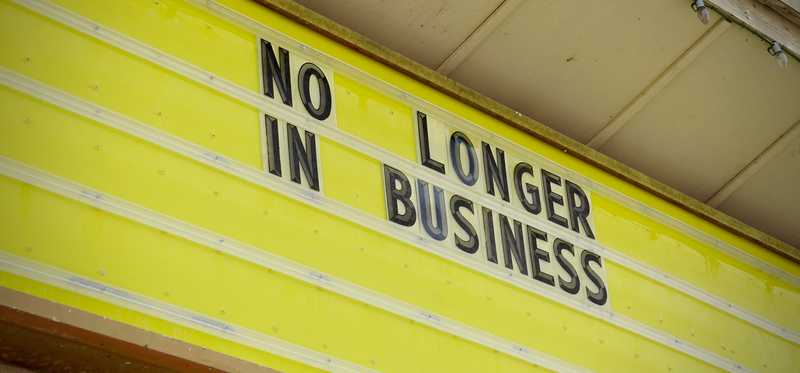
20 Huge Retailers That Are No Longer With Us
The times are a-changing
It’s no secret that the retail industry is changing. At least 8,600 stores are expected to close in the U.S. this year, maintaining a pattern of widespread closing from recent years. As more Americans shop online and fewer visit their local malls, the stores that many of us grew up with are losing their customer base. A number of them are teetering on the edge of relevancy and some have declared bankruptcy but are still operating a fraction of the stores they once had. Others are gone for good.
Let’s take a stroll down memory lane and check out 20 of the country’s biggest retailers that are now just history.
Previous
Next
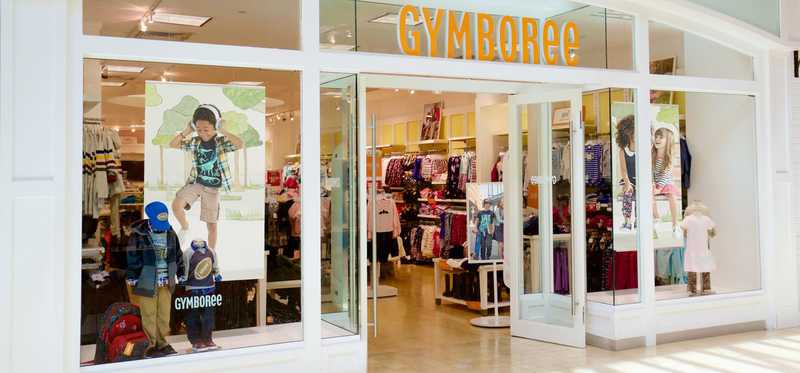
1. Gymboree
The children’s apparel retailer called it quits nearly a year ago, filing for Chapter 11 bankruptcy for the second time in January. The company said it would close all of its more than 800 Gymboree and Crazy 8-branded stores across the country. In an auction after the bankruptcy, it sold the intellectual assets of Gymboree to Children’s Place while Gap acquired the Janie and Jack chain and corresponding assets.
Children’s Place said recently it would revive the Gymboree brand by relaunching its website early next year and opening 200 store-in-stores, tapping a familiar playbook, but Gymboree as a standalone retail chain is dead.
The burden of private-equity debt and shifting consumer tastes proved to be too much for the company.
Previous
Next

2. Toys "R" Us
Perhaps the best known of the recent retail bankruptcies, Toys “R” Us was an iconic brand for generations of children, but mismanagement under a series of private equity owners and a weak e-commerce strategy torched the business.
The company originally filed for bankruptcy in September of 2017, and closed all of its stores in June 2018.
Since then, efforts have been made to revive the brand in some capacity as Target is running the Toys “R” Us website, and the brand is set to open two futuristic, pared-down stores in time for the holiday season, one in Houston and the other in New Jersey. Those stores will be focused on interactive experiences, but the retail chain consisting of cavernous warehouses full of toys that consumers associate with the brand is no longer.
Previous
Next

3. Bon-Ton Stores
Department stores have been hit hard by the retail apocalypse as the age-old model of selling products like clothing, furniture, and cosmetics in one store is no longer necessary in the age of e-commerce.
Bon-Ton Stores, which had been struggling for a long time when the company said in April 2018 that it would close all 256 of its stores, including those under the banners Bergner’s, Boston Store, Carson’s, Elder-Beerman, Herberger’s, and Younkers.
Since then, a tech company called CSC Generation Holdings has acquired the rights to Bon-Ton and its sub-brands, though so far it has reopened just one location, a Carson’s store in Evergreen Park, Illinois.
Bon-Ton’s website is up and running, and CSC had promised more than a year ago to reopen more than 100 stores, but that may be difficult given the headwinds against brick-and-mortar retailers.
Previous
Next

4. Shopko
Shopko, a Midwestern mass merchandise retailer, joined the list of fallen giants earlier this year when it said in March that it would close all 363 of its U.S. stores after failing to find a buyer, though its optical centers would remain open.
The company originally declared bankruptcy in January and, like many struggling retailers, was taken over by private equity in 2005. At the time of its filing, the company cited excess debt and challenges in the retail environment for the bankruptcy, and said it had up to $10 billion in liabilities but less than $1 billion in assets.
Previous
Next

5. Payless
Payless Shoe Source, one of the biggest retailers by store count in the country, said it would close all of its doors back in February.
It was the second bankruptcy for the discount shoe seller, which has suffered under a substantial debt burden and declining mall traffic.
The company said it would close all 2,100 of its stores in the U.S. and Puerto Rico by May, though some stayed open until June.
Payless will continue to operate hundreds of locations internationally, but the brand appears to be gone for good from the U.S.
Previous
Next

6. Dressbarn
Ascena Retail Group (Nasdaq: ASNA), the parent company of several clothing brands including Lane Bryant and Ann Taylor, has been struggling to turn around its business for years. The company owns nearly 5,000 retail stores, making it one of the biggest brick-and-mortar retailers in the country.
In July, the company said it would shutter all 650 Dressbarn locations, one of its discount brands, as it tries to conserve resources for its better-performing brands.
However, Retail Ecommerce Ventures acquired the brand’s intellectual property and plans to relaunch the Dressbarn.com site in 2020.
Previous
Next

7. Orchard Supply Hardware
More than a year ago, Lowe’s (NYSE: LOW) said it would close all 99 Orchard Supply Hardware stores across California, Oregon, and Florida. The move came five years after the home improvement chain acquired OSH out of bankruptcy following its separation from Sears.
CEO Marvin Ellison made the decision just after joining the company as he argued that OSH was too small of a piece of the Lowe’s overall business and its locations were much smaller than the standard Lowe’s store. As he saw it, they were not worth the company’s attention or investment.
Previous
Next

8. Charlotte Russe
Another women’s apparel chain calling it quits, Charlotte Russe said in March that it would shut down all 416 of its locations over the next two months, putting 8,700 employees, mostly part-timers, out of a job.
The news came just a month after Charlotte Russe filed for bankruptcy, attempting to reduce its debt burden and save most of its debt fleet. Sales had fallen sharply, down from $928 million in 2017 to $795 million in 2018, and comps plunged 11.7% in the third quarter of 2018.
With sales fast disappearing like that, it’s clear why the company had to close all of its stores. However, after selling its brand to YM in late March, the company is now planning to reopen approximately 100 stores. Stay tuned.
Previous
Next
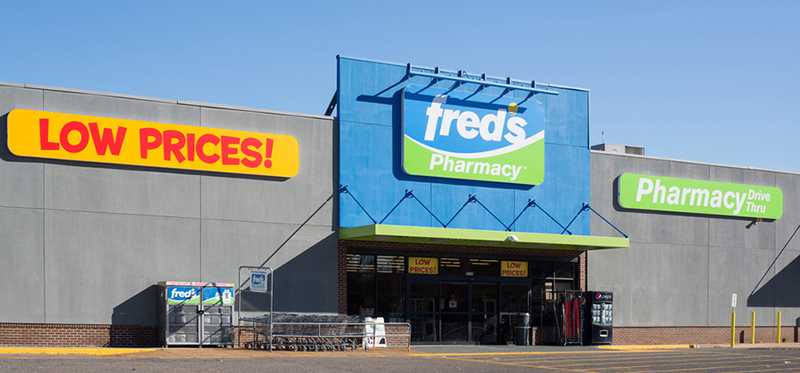
9. Fred's
Yet another discount retailer to add its name to the scrap heap, Fred’s said it would file for bankruptcy and close all of the approximately 500 stores it has remaining.
The company had been losing money since 2015 and had been closing stores and selling businesses including its pharmacy to Walgreen’s in 2018 after a proposed merger with it and Rite Aid fell through.
As rivals like Walmart, dollar store chains, and off-price retailers like TJ Maxx continue to gain share, Fred’s just couldn’t keep up.
ALSO READ: Why Fred's Couldn't Make It as a Discount Retailer
Previous
Next

10. Barneys
While Barneys may not be a huge retailer based on its store count, the high-end New York clothier nonetheless had an outsize reputation and a long history of influencing luxury fashion trends.
That wasn’t enough to keep the retailer afloat amidst the current retail upheaval as the upscale department store announced just weeks ago that it would close all five of its stores and its two warehouses.
Authentic Brands acquired the rights to the brand name, and is planning to license it to retailers including Saks Fifth Avenue. It will also open shop-in-shops inside Saks locations.
The Barneys name will live on, but its stores will soon be gone as a feverish attempt to save them did not turn up a buyer.
Previous
Next

11. Charming Charlie
Jewelry and accessories retailer Charming Charlie was also unable to escape the retail malaise and said earlier this year it would close all 261 of its stores in 38 states.
Like others on this list, the retailer had previously filed for bankruptcy, but a restructuring plan announced in April 2018 that included closing 100 stores wasn’t enough to save the company as it said that efforts to trim its debt burden and cut costs weren’t able to stabilize the business.
Previous
Next

12. Brookstone
Brookstone, the mall-based retailer best known for selling massage chairs and other such gadgets, declared bankruptcy last year, saying that it would close all 102 of its mall-based stores, though it would keep its 34 airport locations operating.
It was the second bankruptcy filing for Brookstone in just four years, following an earlier restructuring in 2014. When it declared bankruptcy last year, it had approximately $500 million in debt and $50-$100 million in assets.
Several months after its bankruptcy, the company sold itself to licensing firm BlueStar Alliance, who will supply department stores with Brookstone products. So Brookstone’s products will live on but the stores will not.
Previous
Next

13. American Apparel
American Apparel was once a staple of teenage wardrobes and its provocative ads were plastered around billboards across American cities.
The company overexpanded and ran into financial trouble as it lost sales to fast-fashion rivals like H&M. Its troubles were compounded by negative press around allegations that founder Dov Charney sexually harassed employees.
The company declared bankruptcy in 2015 and again the following year as the first effort was not able to get the company back on its feet. In 2017, it sold itself to Gildan Activewear, who shuttered all of its stores later that year. Its website continues to operate.
ALSO READ: Millennials Are About to Reshape Retail. Here's How
Previous
Next

14. Sleepy's
Unlike others names on this list, Sleepy’s didn’t go out of business. It was acquired by Mattress Firm in 2015 and its 1,050 stores were gradually rebranded as Mattress Firms over the next two years. However, a number were closed after Mattress Firm declared bankruptcy in 2018 in a move that allowed it to shutter about 700 of its approximate 3,300 locations nationwide.
With the company facing intense competition from online retailers like Casper, this may not be the first time that Mattress Firm is forced to close stores.
Previous
Next

15. Nine West
Payless isn’t the only shoe seller to stumble upon tough times. Nine West, the women’s shoe seller, also went belly-up last year. Holding $1.6 billion in debt, equivalent to its $1.6 billion in revenue it made in 2017, the company said it would close all 70 of its stores and file for Chapter 11 last April.
The news came after private equity firm Sycamore Partners took over the company in 2014 for $2.2 billion, adding debt to the shoe brand in the process. Nine West was over-reliant on distribution to department store chains, especially Sears, which has been in a death spiral for years.
Previous
Next

16. Avenue
Another women’s apparel retailer, Avenue, joined the ranks of apparel retailers going out of business. The company said in August that it would close its 222 stores across 33 states.
Like other bankrupt retailers, Avenue was owned by a private equity firm, Versa Capital Management, which acquired the plus-sized retailer in 2012 when it had nearly double the stores, a sign the business had been struggling for years.
Previous
Next

17. Lifeway
Lifeway Christian Resources announced earlier this year that it would close all 170 of its stores as it pivots to an online-only strategy.
The chain, which has been in business since 1891, sells bibles, Christian media, church supplies, and other such products. The company called the move a “strategic shift of resources to a dynamic digital strategy.” Like other mall-based retailers, Lifeway had seen diminishing customer traffic and in 2017 had an operating loss of $35.5 million.
Previous
Next

18. Blockbuster
Blockbuster isn’t yet gone from the face of the earth. The video rental outfit that dominated the DVD era once had 9,000 locations across the country, but is now down to just one, in Bend, Oregon, though that store shows no signs of closing.
Blockbuster’s business has been hollowed out by video streaming competition like Netflix and rental kiosks like Redbox that are often located in strip malls and supermarkets in rural parts of the country.
Blockbuster’s demise is a reminder of how quickly the retail landscape can change, especially as technology advances.
Previous
Next
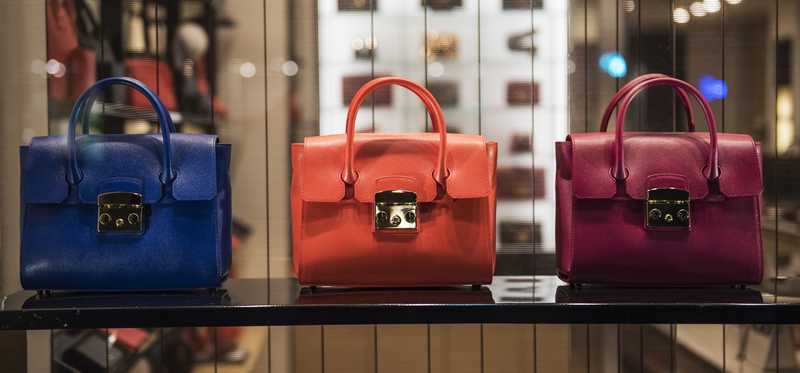
19. Henri Bendel
Preceding Barneys’ bankruptcy was fellow luxury brand, Henri Bendel, the division of Victoria’s Secret-parent L Brands that closed all 23 of its stores in 2018.
Blaming poor sales, L Brands said it would shutter all Bendel locations in January 2019, including its flagship in Manhattan. The 123-year-old brand was best known for its purses and shoes.
L Brands also has been forced to close some Victoria’s Secret stores as that brand has struggled with the rise of e-commerce and changing tastes in lingerie and women’s undergarments.
Previous
Next
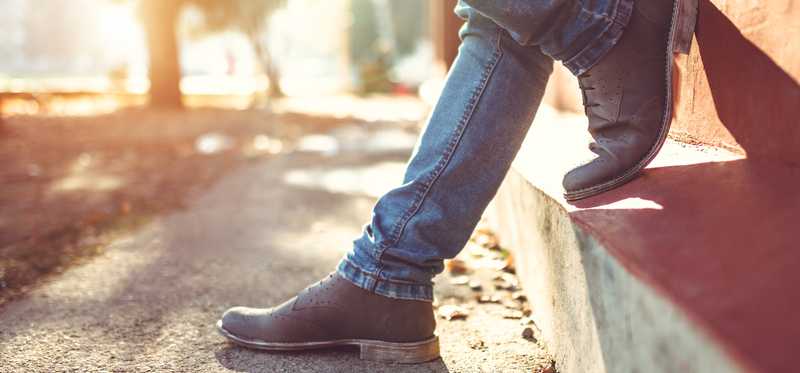
20. Rockport
Even Rockport, the brand of dress shoes once advertised as being comfortable enough to run a marathon in, wasn’t tough enough for today’s challenging retail climate. The company filed for bankruptcy and said it would close all 27 of its stores. Management blamed a difficult separation from its former owner Reebok, who spun off the company in 2015, which led to a series of different owners. The company blamed underperforming stores, heavy competition, and supply chain interruptions for the bankruptcy.
Two months after its bankruptcy, it was purchased by private equity firm Charlesbank Capital Partners, which acquired its global wholesale business, retail operations in Asia and Europe, and e-commerce platform, but left the U.S. Rockport stores closed.
Previous
Next
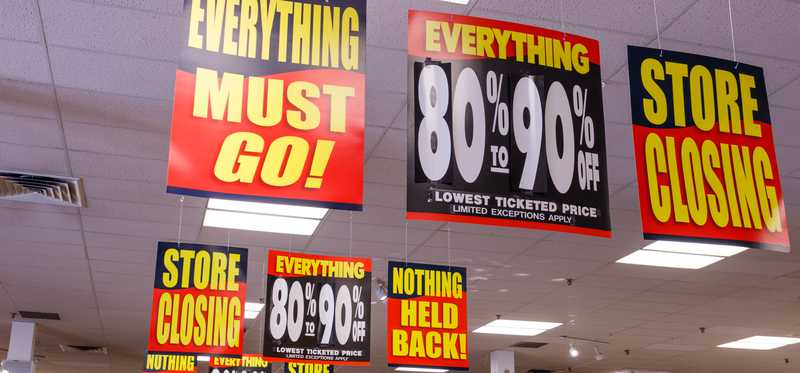
More to come
With the holiday shopping rush set to kick off in just a few weeks, store closing announcements are likely done for the year. Most retailers see sales spike during the busy holiday season -- at least if they sell gift items, -- so they will want to stay open through Christmas.
That means the drumbeat of store closings and bankruptcies is likely to pick up again after the new year. As e-commerce grows in popularity and malls struggle to draw traffic, the retail landscape will continue to transform.
Jeremy Bowman owns shares of Rite Aid, Target, Netflix, and The Children’s Place. The Motley Fool owns shares of and recommends Netflix. The Motley Fool recommends Lowe's and The TJX Companies. The Motley Fool has a disclosure policy.
Previous
Next
Invest Smarter with The Motley Fool
Join Over Half a Million Premium Members Receiving…
- New Stock Picks Each Month
- Detailed Analysis of Companies
- Model Portfolios
- Live Streaming During Market Hours
- And Much More
READ MORE
HOW THE MOTLEY FOOL CAN HELP YOU
-
Premium Investing Guidance
Market beating stocks from our award-winning service
-
The Daily Upside Newsletter
Investment news and high-quality insights delivered straight to your inbox
-
Get Started Investing
You can do it. Successful investing in just a few steps
-
Win at Retirement
Secrets and strategies for the post-work life you want.
-
Find a Broker
Find the right brokerage account for you.
-
Listen to our Podcasts
Hear our experts take on stocks, the market, and how to invest.
Premium Investing Services
Invest better with The Motley Fool. Get stock recommendations, portfolio guidance, and more from The Motley Fool's premium services.